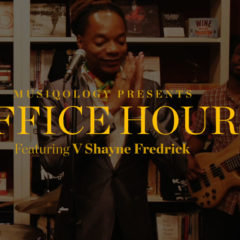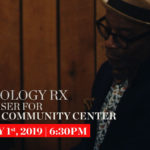One of the iconic scenes from 1985’s Back to the Future is the “Enchantment Under the Sea Dance,” where an intrepid, time-traveling Marty McFly needs to successfully reunite his 1950s-era parents to ensure his existence back in, you know, the future. The band is a slow-playing snooze, four black musicians in front of the all-white Hill Valley High crowd. After a freak accident closes cuts the guitar player’s hand with a screwdriver, our hero assumes the Gibson Les Paul, apologizing to the crowd. “This one’s an oldie,” he says.
The band kicks into high gear, a blues riff in B, and the timeline is preserved. The original guitar player calls his cousin from backstage to tell him about the new sound. “Chuck! Chuck!,” he yells. “It’s your cousin, Marvin Berry! You know that sound you’re looking for? Well listen to this!”
And on that night, November 5, 1955, Marty McFly invented rock and roll.
This to a certain extent is an appropriate metaphor for Chuck Berry’s relationship to the music industry. Berry died Saturday at the age of ninety years old, leaving behind a laundry list of tributes. We’ve captured some of them here. But before then, we need to do a little reflection. Rock and roll, a genre of music he perhaps above all others was responsible for, was Chuck Berry’s gift to the world. He gave it freely. He never reaped many of its benefits.
It’s impossible to copyright a feeling, and that’s what Berry’s rock and roll persona was more than a specific song or melody (though “Johnny B. Goode,” some might say, is among the most-covered songs by rock bands in infancy). His thin tone with the quick-strummed chords communicated the chaos and fun of teenage life. “No Particular Place To Go” and “Promised Land” soundtracked the newly mobile American public in their Chevys and T-Birds. Heck, “Rock and Roll Music” laid out the blueprint for how to replicate it.
And replicate it others did. The Beach Boys’ “Surfin’ U.S.A” was a musical copy of Berry’s “Sweet Little Sixteen” with beach words over Berry’s chords. Berry would have to sue to get publishing rights. The Beatles, The Rolling Stones, and The Yardbirds made their early hay with Berry covers. The Rolling Stones’ statement upon his passing was telling: “His songs will live forever,” they said.
While of course many of these groups paid tribute to Berry, influence and appropriation are two ends of a double-necked guitar. Berry’s only number-one hit was the crude novelty song “My Ding-A-Ling.” The Grammys’ nascent rock and roll category—first awarded in 1961—was busy awarding Bent Fabric(who?) and Petula Clark. Berry’s first and only Grammy came in 1984. It was a lifetime achievement award.
In fact, what’s most striking in the video from that 1984 celebration is the live performance. Berry, 58 at the time, delivers a typically alive performance of “Maybellene,” complete with his usual acrobatics. But then Stevie Ray Vaughan and George Thorogood emerge, taking center stage for the remainder of the performance, while Berry fiddles with the amplifiers in the background. And while we might read this as some discomfort with the spotlight—Berry performed infrequently in his later years outside of a once-a-week residency at Blueberry Hill in the St. Louis home he never left. The last people he thanked that night during his acceptance speech were “the many groups who have recorded my numbers.”
Below are sixteen stories, many of which do engage at least somewhat with Berry’s complicated and somewhat unsatisfactory later years. While Berry unquestionably deserves celebration (and his undeniable legal indiscretions suggest an imperfect man), we at MusiQology felt it right to remember him in context, so that the nostalgic platitudes thrown his way throughout the popular media do not further flatten his legacy.
Chuck Berry, Rock ’n’ Roll Pioneer, Dies at 90 — The New York Times
His guitar lines wired the lean twang of country and the bite of the blues into phrases with both a streamlined trajectory and a long memory. And tucked into the lighthearted, telegraphic narratives that he sang with such clear enunciation was a sly defiance, upending convention to claim the pleasures of the moment.
Chuck Berry, Rock & Roll Innovator, Dead at 90 — Rolling Stone
By fusing blues and country, Berry also invented a signature guitar style – like “ringing a bell,” as he put it in “Johnny G. Goode” – that was imitated by bands from the Stones and the Beach Boys to punk rockers. His lyrics – largely about sex, cars, music and trouble – introduced an entirely new vocabulary into popular music in the Fifties. In his songs, Berry captured America’s newfound post-war prosperity – a world, as he sang in “Back in the U.S.A.,” where “hamburgers sizzle on an open grill night and day.”
Chuck Berry, a Founding Father of Rock ‘n’ Roll, Dies at 90 — Billboard
He explained his appeal to adolescents across different cultural backgrounds: “Everything I wrote about wasn’t about me but [was about] the people listening.” He had a way of identifying what people wanted to express, but weren’t able to, during this segregated time.
Chuck Berry’s Memoir Grabs You Like a Song — The New York Times
Chuck Berry being Chuck Berry, he comes up with his own portmanteau for the South’s racial attitudes during this era. That word is “hospitaboo,” a combination of “hospitality” and “taboo.” It means, he writes, “how do you do but don’t-you-dare.”
Chuck Berry Invented the Idea of Rock and Roll — Vulture
Of the original people who were there when rock was formed, he’s the only one who not only wrote most of his own material, but wrote substantive material. He was writerly. He filled his songs with meanings and subtexts that resonate still today by means of a somewhat jokey but always intent poesy. And with those talents he added one thing to rock and roll it didn’t have before, and this thing he added might well be the thing that makes us talk about it, still today.
Why Chuck Berry Is Even Greater Than You Think — Rolling Stone
Has there ever been a more perfect pop song than “Nadine,” a catchier encapsulation of story line and wit in four verses and a chorus, in which the protagonist (like all of Chuck’s characters, a not-too-distant stand-in for its author but never precisely himself) is introduced “pushing through the crowd trying to get to where she’s at/I was campaign shouting like a Southern diplomat.”
Chuck Berry, Fiery and Flinty Rock ’n’ Roll Innovator — The New York Times
He gave it virtuoso playing via guitar work that drew on country and the blues. He made it a songwriting genre with wry, detailed lyrics that helped shape the idea of American freedom via stories of teenage abandon or open-road adventure. He embodied the music by giving it physical language, from his signature duck walk to his coiffure, which was equal parts structure and flair. (He also was a beautician, having studied hairdressing and cosmetology when he was still playing in small bands in St. Louis in the early 1950s.) And in performance, he sold the music hard, with eyes bulging, hips swaying and a sly smile that indicated he knew just how much he was pushing the envelope.
Chuck Berry and the Curse of the Founders — Forbes
Berry’s relative lack of financial success mirrors that of other genre founders like DJ Kool Herc in the hip-hop world and the late Frankie Knuckles with house music. Neither performer ever came close to landing on the hip-hop and electronic music earnings lists compiled by FORBES every year; Herc rarely plays shows these days and Knuckles appeared even less frequently in his later years than Berry did in his 80s.
Remembering Chuck Berry — St. Louis Magazine
Even though his fanbase included people like Bob Dylan and Keith Richards, Berry was generous, gracious, and open to fans in his hometown. When we put him on the cover of our “100 Greatest Musicians” issue, in April 2012, we threw the party at Blueberry Hill. Berry made a surprise appearance, playing with St. Louis blues prodigy Marquise Knox, chatting with folks, and signing magazines.
Chuck Berry Lives! — The New Yorker
Berry wrote “Carol” in 1958, the same year as “It Don’t Take But a Few Minutes,” “Around and Around,” “Blues for Hawaiians,” and the everlasting “Johnny B. Goode.” When Berry and Richards got together in St. Louis, to perform that song and others, they were joined by an astonishing array of players: Johnnie Johnson, on piano; Eric Clapton and Robert Cray, on guitar; Steve Jordan, on drums. Etta James and Linda Ronstadt sang. But in rehearsal, and in the subsequent film by Taylor Hackford, “Hail, Hail! Rock ’n’ Roll,” it was the brittle dynamic between Berry and Richards that was the whole story. Time and again, Berry stops Richards and makes him play the famous opening riff his way.
Chuck Berry: 10 Great Collaborations — Rolling Stone
By the mid-Sixties, Chess Records was ruled by two astounding axmen: Berry and Bo Diddley. It was inevitable that they’d be thrown onto an album together. The product, 1964’s Two Great Guitars, isn’t as exciting as its premise would portend; the record comprises only four tracks, with two of them being so-so offerings from Berry and Diddley solo. The remaining two cuts, though, are something else entirely. “Chuck’s Beat” and “Bo’s Beat” are epic jam sessions between the two guitarists, clocking in at 10 and 14 minutes, respectively – at a time when such long songs were highly unusual on rock records. The duo made the extended format work, too, pushing each other to foot-stomping, string-bashing extremes.
Chuck Berry brought a poet’s touch — and respectability — to a brash new style of music — LA Times
Berry consistently avoided cliches and stock images or situations. He was investing layers of emotion and meaning into songs long before Bob Dylan came along and started people talking about rock ’n’ roll as an art form.
Chuck Berry Was More Than Just a Riff — The New Republic
No one was more important to the development of rock n’ roll than Chuck Berry. Yes, rock music predated Berry, and other people, particularly Elvis, were more responsible for popularizing the genre. But the irony of Berry being defined by the riff and the duck walk and little else is that no one grasped the sheer range of rock like Berry did, at least until the Beatles. From the very beginning, Berry’s sound encompassed a host of different elements: Blues, R&B, Caribbean, folk, teeny bopper, and, perhaps most of all, country and western.
Chuck Berry helped build rock-and-roll. Then he took it for a ride — Washington Post
Even if Chuck Berry never sang all of those beautiful words about V-8s, jitneys, limousines and Coupe de Villes, it was obvious that he was making a new kind of car music. His songs started like engines. A guitar riff would stutter like a crankshaft, then the beat would kick in, and suddenly everything smelled like motor oil and hormones. This new vroom-vroom music was dubbed rock-and-roll, and its founding father — who died in Missouri on Saturday at 90 — made it with an electric guitar, a surplus of charisma and the knowledge that teenage hearts have always pumped desire.
Roll Over, Beethoven — Slate
Berry possessed many geniuses as a songwriter, but the most consequential was his ability to write songs about being black in America that could double as allegories for being a teenager in America, an audacious bit of rhetorical alchemy that altered popular culture and reverberates to this day. Berry brought the blues into America’s high schools, and somehow did so without sacrificing any of the form’s lyricism, wit, and pathos, even while sometimes sacrificing specificity.
Remembering Chuck Berry, Rock’s Unruly Founding Father — Houston Press
If rock and roll eventually outgrew Berry’s influence, for better or worse, it has yet to eclipse his impossibly long shadow. Just listen to the tributes that have poured in since after his death. Bruce Springsteen wrote, “Chuck Berry was rock’s greatest practitioner, guitarist, and the greatest pure rock ’n’ roll writer who ever lived.” Former president Barack Obama added, “Chuck Berry rolled over everyone who came before him – and turned up everyone who came after.”
UNRECOGNIZED BY CLAPTON
http://www.nj.com/entertainment/music/index.ssf/2017/03/eric_clapton_madison_square_garden_nyc_2017_review.html

 Share On Facebook
Share On Facebook Tweet It
Tweet It







